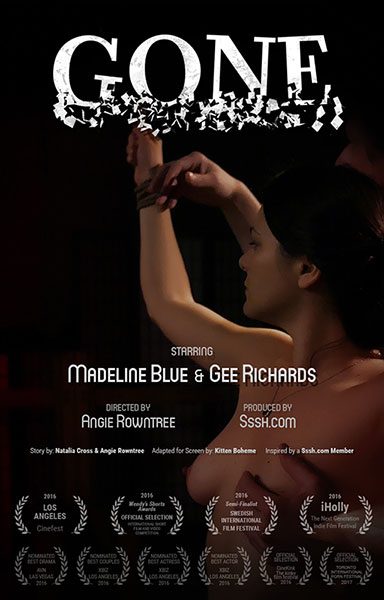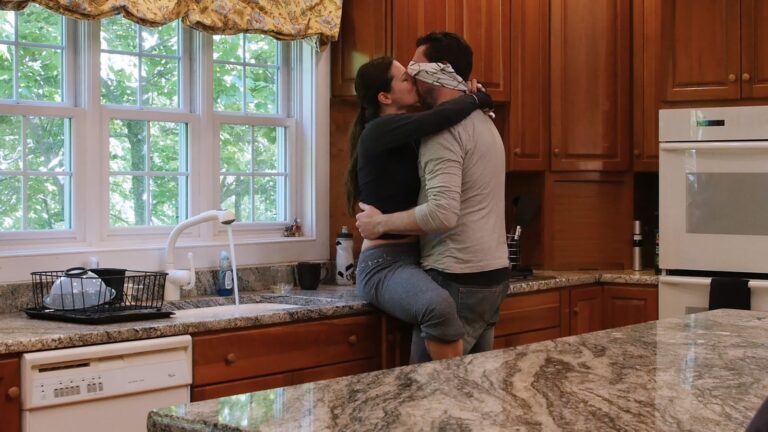By Rich Moreland from 3HatterGrindHouse
A short film produced by Sssh.com titled Gone turns the concept of pornography on its head. Identified as a featurette, the story of love and loss is directed by Sssh.com founder Angie Rowntree and stars Madeline Blue as Rebecca and Gee Richards as Todd.
The company’s website describes the film as a “beautiful and intimate story inspired by a Sssh.com member.” It is all of that and more. (PG Trailer below)
The movie is being praised for the ways it defines two lovers whose story leaves us to wrestle with our own emotions. However, I came away with another view that for me recolored the narrative’s meaning.

But there is something else within this movie’s thirty-three plus minutes: a statement of where we are in today’s America. To put it bluntly, every politician should be required to watch it and if he or she is anti-porn, just cover up the offending parts. There is a larger meaning here that shadows the story–the anxious, brooding phantom that lurks in our national psyche.
Take a look at the imagery director Rowntree has so carefully placed within the visual narrative.
The beginning is a wooded path, the wilderness every lawmaker and foreign policy wonk tries to negotiate with an all too often futility.
Then there’s small town America, scenes of village greens and community days out. The freedoms worth fighting for . . . so we are told.
And that white clapboard house with the picket fence, “We were living the American dream,” Rebecca says of her home with Todd.
But they, like many who wish a bellicose country would rise up and smite its enemies, have impaired vision that is a setup for tragedy. In fact, we see a smiling Todd blindfolded while he playfully hugs Rebecca in the kitchen. It’s a chilling moment in a modern and familiar tale of unexpected sadness.
And, of course, there is the real image of incompetence: the lolling Teddy Bear in the couple’s bedroom. His eyes are covered with a hat that makes him look a bit inebriated–perhaps with a self-ingratiating smugness too many of us let pass for the ability to govern and a belief that we know what is best for everyone.
Rope Marks
The sorrow of Gone is that real people who have real feelings, hopes, and dreams pay a price for circumstances beyond their control. No where is that better seen than in the image of that electronic device devoid of flesh and affection, the ubiquitous cell phone, that reduces Rebecca’s existence to anguish, pleading, and shouting into emptiness.
The lovemaking (notice I did not say sex) in the story is as authentic as it gets. In fact, Madeline and Gee are a couple in their private lives so the scenes are bona fide statements of profound affection.
There a touch of kink (Fifty Shades is reworking our erotic landscape) and in an emotional dream sequence, Rebecca is restrained for her pleasure as well as Todd’s. When she comes back to reality, rope marks are eerily on her wrists . . . a kind of bondage stigmata that relates more that it seems.
Director Rowntree adds two intimate images to their relationship. The most significant is the altar of purification in the couple’s dungeon basement. Rebecca, legs spread on a table, is orally worshipped in a scene that is ritualistic in tone and intent. No close-ups, just a glimpse of what this movie is all about: an illuminated sacrifice in stark, barren darkness, be it a concrete dungeon or a faraway desert in a distant land. . . an unforgiving repetition that has endured throughout civilizations.
Next, of course, are the rope marks. The viewer is reminded that we are raised in a society that too often constrains its sexuality, failing to release its emotions except when “celebrating” its losses. If it is personal and intimate, we are embarrassed and turn away. If it’s a funeral procession, we stand tall and salute while bitterly holding back our weakness, our tears.
Of course, Rebecca understands, turning traditional notions against themselves in a personal triumph that hints of unbroken bonds. She smiles faintly as the fade out pulls the shades over the screen.
Crisp and Unread
When the film’s ending was within reach, I figured it out before I got, as one reviewer implies, the punch in the gut. But it didn’t soften the blow.
Oh yes, there’s a final image, the confirmation of what the viewer already suspects: a newspaper—as crisp and unread as the day it was delivered. It’s isolated, as Rebecca’s life is now seemingly condemned, on a small table in a corner near the stairs of that house with the picket fence.
It’s like hearing that your best friend has passed on but the reality doesn’t set in until you walk into the funeral home for the viewing.
Rebecca’s words–cries of anger, grieving, and overwhelming misery–are themselves part of the ritual. How many times have they been repeated over and again for almost two decades?
“Now that Todd’s gone I wish I’d never met him in the first place.”
And there are places we as a nation should never have gone either in pursuit of our own enduring rituals.
This review first appeared on 3HatterGrindHouse and has been reprinted with permission.
GONE PG Trailer.



Comments are closed.